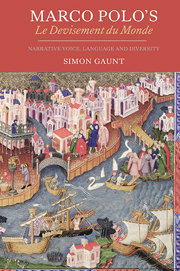Book contents
- Frontmatter
- Contents
- Illustrations
- Acknowledgements
- Abbreviations and a note on citations and editions
- Introduction: Le Devisement du Monde: textual tradition and genre
- 1 Narrative voice and style: ‘ego Marcus Paulo’
- 2 Language and translation: ‘in lingua Galica dicitur’
- 3 Knowledge, marvels and other religions: ‘oculis propriis videt’
- 4 Diversity and alterity: ‘diversarum regionum mundanas diversitates’
- Conclusion: et ipse non notavit nisi pauca aliqua, que adhuc in mente retinebat
- Bibliography
- Index
- Already Published
3 - Knowledge, marvels and other religions: ‘oculis propriis videt’
Published online by Cambridge University Press: 05 September 2013
- Frontmatter
- Contents
- Illustrations
- Acknowledgements
- Abbreviations and a note on citations and editions
- Introduction: Le Devisement du Monde: textual tradition and genre
- 1 Narrative voice and style: ‘ego Marcus Paulo’
- 2 Language and translation: ‘in lingua Galica dicitur’
- 3 Knowledge, marvels and other religions: ‘oculis propriis videt’
- 4 Diversity and alterity: ‘diversarum regionum mundanas diversitates’
- Conclusion: et ipse non notavit nisi pauca aliqua, que adhuc in mente retinebat
- Bibliography
- Index
- Already Published
Summary
The main interest of the Devisement du monde has always been its subject-matter. Though several thirteenth-century Latin texts based on eye-witness accounts of the Far East preceded it, the wealth of detail and also possibly the fact that it circulated in the vernacular as well as in a variety of redactions seem to have ensured the Devisement its immediate success and its impressively long shelf life. European readers were apparently avid for information about the strange lands that lay to the East, and although these had always been represented as extraordinary, Marco Polo's account suggested they were extraordinary in new and unexpected ways, since his differed so substantially from previous accounts deriving from ancient textual traditions (encyclopaedic material deriving from Pliny, Solinus and so on; the Alexander tradition), with their barbaric hordes in need of enclosure, monstrous races and exotic, sometimes quasi-supernatural, creatures. Readers seem to have been spellbound by Marco's tales of the untold wealth of Kublai Khan's empire, of its astonishing economic and material infrastructure, of the amazing variety of human societies – many of them clearly far from barbaric – to be found in Asia, of the range of religions as compared to the Christian/pagan dichotomy found in some popular vernacular texts, and of exotic but nonetheless naturalistic animals and plants.
- Type
- Chapter
- Information
- Marco Polo's Le Devisement du MondeNarrative Voice, Language and Diversity, pp. 113 - 144Publisher: Boydell & BrewerPrint publication year: 2013



